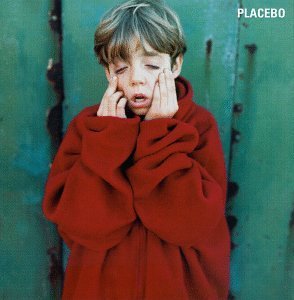A placebo effect is the tendency of any medication or treatment, even an inert or ineffective one, to exhibit results simply because the recipient believes that it will work.
Remedy, Remedies, The Remedy or Remediation may refer to:
A Peeping Tom is a nickname for a male voyeur, from the character Peeping Tom, who spied on the Lady Godiva's naked ride.

A placebo is a substance or treatment which is designed to have no therapeutic value. Common placebos include inert tablets, inert injections, sham surgery, and other procedures.

Placebo are a British alternative rock band, formed in London in 1994 by vocalist–guitarist Brian Molko and bassist–guitarist Stefan Olsdal, and in late 1994 Robert Schultzberg joined as drummer. Molko was born in Belgium and Olsdal and Schultzberg in Sweden; Molko and Olsdal grew up in Luxembourg before separately relocating to London and becoming British citizens. Schultzberg left the band in 1996 shortly after the release of the band's eponymous debut album due to conflicts with Molko, and was replaced the same year by Steve Hewitt.
Rehabilitation or Rehab may refer to:
Inhibitor or inhibition may refer to:
Drug treatment may refer to:

Placebo is the debut studio album by British alternative rock band Placebo. It was released on 17 June 1996 by record label Virgin. It is the only album recorded with drummer Robert Schultzberg before his departure from the group.
Observer effect, observer bias, observation effect, or observation bias may refer to a number of concepts, some of them closely related:
D is the fourth letter of the Latin alphabet.

Without You I'm Nothing is the second studio album by British alternative rock band Placebo. Recorded in mid-to-late 1998, it was released on 12 October 1998 by record labels Hut and Virgin Records.

"Nancy Boy" is a song by British alternative rock band Placebo, released on 20 January 1997, as the fourth single from their debut self-titled album, released on Hut Records. As with their first single "Come Home", the single edit is a re-recorded version, noticeably different from the album version. "Nancy Boy" contains themes of drugs, sex, gender confusion and bisexuality. "Nancy Boy" became their breakthrough single, peaking at number four in the UK Singles Chart a month after the single's release. While Placebo charted at number forty upon its release, after the release of "Nancy Boy" the album re-entered the UK Albums Chart at number five in February, staying on chart for thirteen weeks.

"Every You Every Me" is a song by British alternative rock band Placebo, released as the third single from their second album, Without You I'm Nothing, on 25 January 1999. It was released as a 2-CD set and on cassette, but promotional copies on 12-inch vinyl exist. The single managed to chart at number 46 in Australia, number 99 in Germany, and number 11 on the UK Singles Chart. There are two versions of the video, both filmed live at London's Brixton Academy; one includes clips from the film Cruel Intentions. An alternative video taking place at a casino was filmed in November 1998 but would not be released until 18 years later as part of the promotion for A Place for Us to Dream.
Transmutation may refer to:
Teenage Angst may refer to:
Never Let Me Go may refer to:
This page is based on this
Wikipedia article Text is available under the
CC BY-SA 4.0 license; additional terms may apply.
Images, videos and audio are available under their respective licenses.





